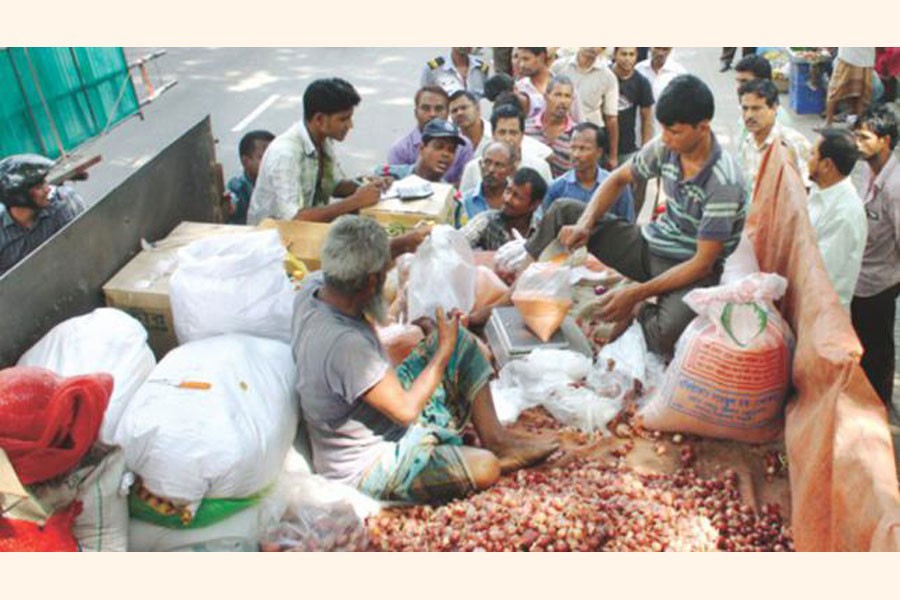Economic pains may entail political repercussions as the TCB-listed price indices have surged up 50 per cent, says a policy think-tank and suggests recasting priorities to tackle the crisis.
The Centre for Policy Dialogue Thursday stressed the need for a new consumption basket for measuring the rate of inflation as it believes that the existing food and non-food basket do not reflect the real picture of price rises that people pay through their nose.
It feels that the inflation gauge should be formulated based on rigorous research as regards consumer behaviour and expenditure patterns.
Focusing on yet larger economic paradigm shift in the face of the global exigencies, the CPD suggests that all targets, projections, and plans in the monetary policy and the 8th Five-Year Plan should be revised in accordance with this new consumption basket for the CPI.
Bangladesh Bureau of Statistics or BBS uses two baskets--one for rural areas and the other for urban areas. The rural basket covers 318 items while the urban basket consists of 422 commodities.
The CPD has noticed inflation having touched nearly double digits in recent months as the real picture is different on the market.
"The real inflation is much higher which we feel when we visit local markets," said Dr Fahmida Khatun, executive director of the CPD, while presenting a keynote on 'Slowdown in Global Economy and Challenges for Bangladesh: How to Tackle?'

Dr Khatun said the prices of the Trading Corporation of Bangladesh (TCB)-listed commodities have surged up to 50 per cent.
She said the basket was actually prepared way back in 2005 by the BBS-long before the global dearth stemming from pandemic and war.
"Over the past 17 years, have we remained in the same food habit?" She posed the question.
The think-tank suggests that the National Board of Revenue (NBR) should immediately consider removing the advance income tax (AIT), advance tax (AT), and regulatory duty (RD) on all imported essential food items to stem the price surges of the key food items on the local market.
The CPD said a Minimum Wage Board should be formed to consider increasing the minimum wages in all industries so that workers earning minimum wages may at least afford basic food.
Private-sector corporations should consider a higher salary increment in 2022, given that a 5.0- percent increment in salary in the face of double-digit price hikes is compelling workers to compromise their standard of living seriously.
The volume of sales of essential commodities through the open-market system (OMS) should be increased, the CPD advocates for fighting inflation.
Turning to the crunch-ridden power and energy sector, Dr Khatun said there is an inconsistency relating to power generation and load-shedding data.
"The data we get show that the generation is huge but the load-shedding is continuing …" she went on.
She said unreliable and misleading data do not reflect reality.
Renewable energy (RE) needs to be more emphasised and prioritized.
As global oil prices are declining over time, BPC should consider a downward revision of oil (diesel, octane, petroleum) prices.
She said if the global energy prices (oil & LNG) do not decrease, the government should be prepared to spend a significant portion of foreign reserves on energy imports.
The government should look for long-term loan opportunities from the IMF/WB/IDB, she said, mentioning that the government is seeking a total of US$5.5 billion in loan from the World Bank and the International Monetary Fund.
The government must take necessary actions against hundi operations - a fuller implementation of the action plan identified in the National Strategy for Prevention of Money Laundering and Combating Financing of Terrorism can be a starting point
Dr Khatun notes that the number of migrant workers has surged but the remittance inflows remained much lower, which means unofficial channel is very much attractive to the expatriate Bangladeshis.
The CPD, however, said the central bank of Bangladesh should guard against further depletion of the forex reserves, particularly in view of the recent debate regarding the estimation methodology, and pursue a floating exchange-rate policy.
She mentioned that, as of October 12, the foreign-exchange reserves were worth $36.3 billion. The IMF argued that at least $7.2 billion should be deducted from the $36.3 billion on grounds of calculation methodology.
Replying to questions from the media, Dr Fahmida said there are no proactive measures from the government side despite the fact that the FAO (Food and Agriculture Organisation) and other organisations having warned about food uncertainty for Bangladesh.
She suggests reforms to combat the food crisis.
While replying to questions, CPD research director Dr Khondker Golam Moazzem aired fears that the crisis may spill over into other sectors.
He said the 'problem would be solved in February and March'--- such words should not be uttered from government side rather it should be thought of medium-and long-term crisis for the economy.
This existing crisis relating to food and power will affect employment. "And these crises will ultimately lead to political crisis in the country," Dr Moazzem adds.
He was also critical of the capacity payment to the private power producers, saying that the government has spent Tk 260 billion for the capacity payments last year.
"The capacity-charge payment is made in dollar as per the agreements with the producers," he says in relation to the country's falling forex reserves.


